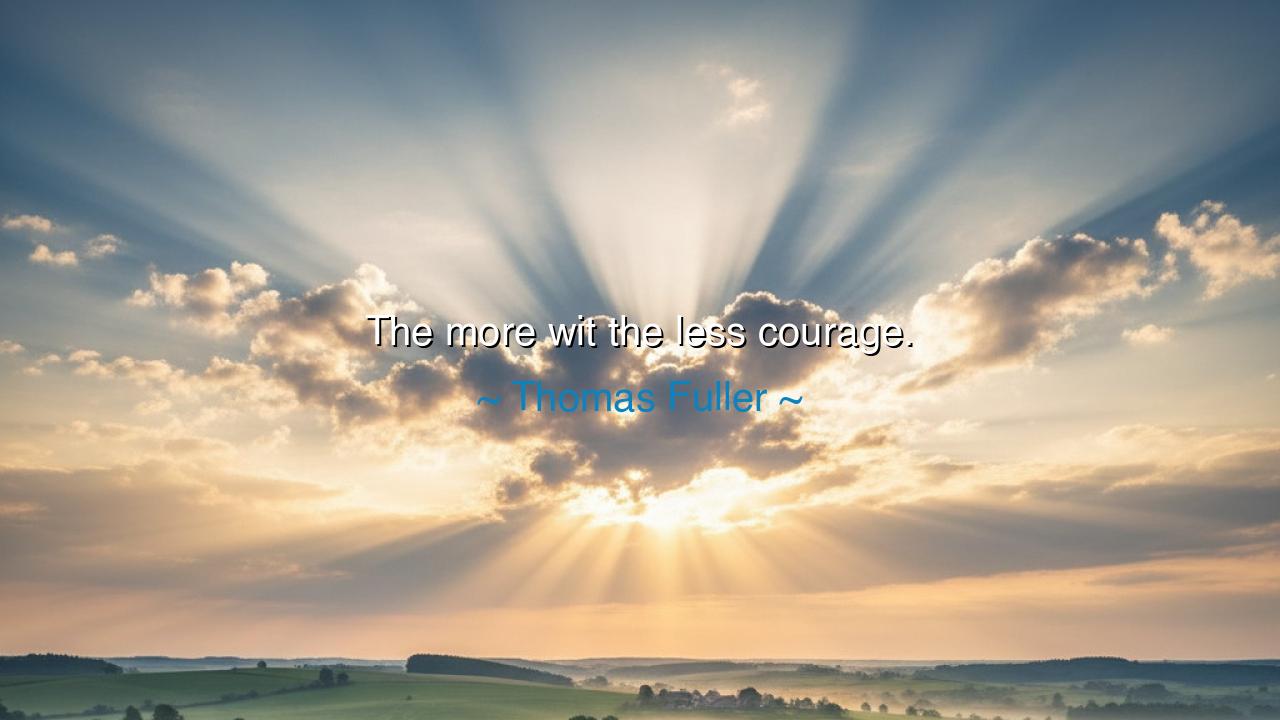
The more wit the less courage.






"The more wit, the less courage." — Thomas Fuller
In this brief but piercing aphorism, Thomas Fuller, the English divine and scholar of the seventeenth century, unveils a paradox of the human mind. He warns that wit, though a splendid gift of intellect, often becomes the enemy of courage. For the man of quick thought, who sees every peril and calculates every risk, is often the man who hesitates. His mind, too sharp to rest, multiplies doubts where a simpler soul would act. The clever fear what they can imagine; the brave act because they see what must be done. Thus Fuller teaches that intelligence without resolve is like a sword left sheathed — brilliant to behold, but useless in battle.
To understand this, one must first know the nature of wit. Wit is the keen light of reason — swift, discerning, alert to danger, able to see the web of consequences that others miss. But light, though it reveals, also blinds when it flashes too bright. The witty man sees not only what might succeed, but also what might fail; he hears the whisper of every “what if,” until his mind becomes a prison of caution. Courage, by contrast, belongs to the heart — that steadfast force which moves forward even when the mind trembles. It is not ignorance of danger, but mastery over it. The wise see the abyss and leap; the coward stares and withers.
History itself gives witness to Fuller’s insight. Consider Hamlet, prince of Denmark — no real man, but the truest image of this truth ever written. His mind, fertile and sharp as lightning, turns every thought to doubt. He reasons and reasons, until reason itself chains him to inaction. The villain acts; the philosopher delays. “Thus conscience doth make cowards of us all,” he says — a confession that too much wit, too much seeing, drains the blood of courage. In him, thought kills deed, and Denmark falls not for lack of strength, but for the surfeit of reflection.
And yet, this is not to condemn wisdom or wit, for they too are divine gifts. It is only to remind us that the mind must serve, not rule, the will. A wise general knows the enemy’s strength — but if he lets that knowledge paralyze him, he will never march. A sailor who fears every storm will never leave harbor. Fuller’s words call us to balance: reason should guide courage, not destroy it. To think is noble, but to act despite fear is divine. The world was not built by those who hesitated, but by those who dared.
In the annals of time, we find a shining example in Christopher Columbus, who faced ridicule, uncertainty, and the terror of the unknown sea. He was no fool; he knew the dangers that lay ahead — starvation, mutiny, the endless ocean. But though his wit perceived the peril, his courage surpassed it. He let hope weigh more than fear, and faith more than calculation. The timid minds of his age laughed at him; yet his ships reached the New World, and his name was carved upon the map of destiny. So it is: wit can show us the boundaries of the known, but only courage can cross them.
Fuller’s warning, then, is timeless. He speaks to all who hesitate on the edge of action — the thinkers, the planners, the cautious. He whispers: beware the mind that talks you out of your own greatness. Overthinking is the thief of valor. The clever man may survive, but the courageous one lives. The first seeks safety; the second, meaning. True life belongs not to those who merely understand the world, but to those who dare to change it.
So, my child of reason and fire, let your wit be your lantern, not your chain. Let it light your path, but not slow your step. Courage must remain the captain, and wit the compass. When fear rises, think not only of what might go wrong, but of the glory that might unfold if you dare. There is no greatness in timidity, no immortality in hesitation. The mind alone may plan, but the heart alone can conquer.
Thus, the lesson of Thomas Fuller is clear and eternal: be not so clever that you forget to be brave. For wisdom without courage is a dream that never wakes, and courage without fear is the spark that forges destiny. Let your thoughts be deep, but let your will be deeper still. Act, even when your mind trembles — for it is not the clever who shape the world, but the bold who walk through their doubts and do.






AAdministratorAdministrator
Welcome, honored guests. Please leave a comment, we will respond soon